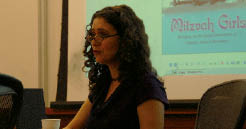To Brooklyn, in Search of a Sacred Past
In documenting the lives of Hasidic women, anthropologist Ayala Fader explored her own roots
“I had a yearning for a lost past,” says Ayala Fader, Associate Professor of Anthropology at Fordham University’s Lincoln Center campus. “I have always had an interest in alternative communities that draw on a sacred past, while making it meaningful for today.”
Thus when Fader, then a doctoral student at NYU, was casting about for a dissertation topic some years ago, she turned to her own roots. Fader had grown up in a Reform Jewish household in New York City and felt a strong nostalgia for the world of her Eastern European great grandparents. She remembered traveling to Brooklyn to visit Hasidic communities as part of an elementary school field trip. She was interested in bilingualism in an urban context.
Eventually, Fader’s research brought her to Boro Park, Brooklyn, where, for two years, she immersed herself in a Hasidic community, focusing on the language and socialization of young women. She participated in life-cycle events, such as bridal classes. Eventually, she turned the outcome of her “longitudinal study” into a book, Mitzvah Girls: Bringing Up the Next Generation of Hasidic Jews in Brooklyn (Princeton University Press, 2009), which she broadened to include the experiences, values and roles of “girls who want to become the next generation of believers.”
Although Fader, a self-described Jewish feminist, had initially assumed that she and her subjects would share some common ground, she soon saw that certain linkages were tenuous. “I realized how different we were, how we had completely different understandings of what it meant to be Jewish and a woman and a New Yorker.”
Fader has plenty of experience navigating cultural differences. At TC, she earned her master’s degree in the TESOL program. Afterward, she traveled, teaching English in Spain and Mexico. As a doctoral student, she supplemented her income as an English teacher at the Fashion Institute of Technology, Rockefeller University and the New School.
“There are definitely connections between teaching English as a second language and anthropology,” she says.
Since publishing Mitzvah Girls, Fader has kept a busy schedule of lectures and readings. The book, which is the first to explore the upbringing of Hasidic Jewish girls in the United States, received the 2009 Barbara Dobkin Award in Women’s Studies from the National Jewish Book Council and a New York City Book Award, sponsored by the New York Society Library.
As for the longing that had initially brought Fader into the Hasidic world, it was satisfied—though not in the way she’d originally imagined. Speaking of the kinship that she developed with her subjects-turned-friends, Fader says, “I might not always agree with their views on Judaism or their politics, but I have great respect for them and the level of seriousness they have with regard to religion.”
Published Monday, May. 31, 2010
